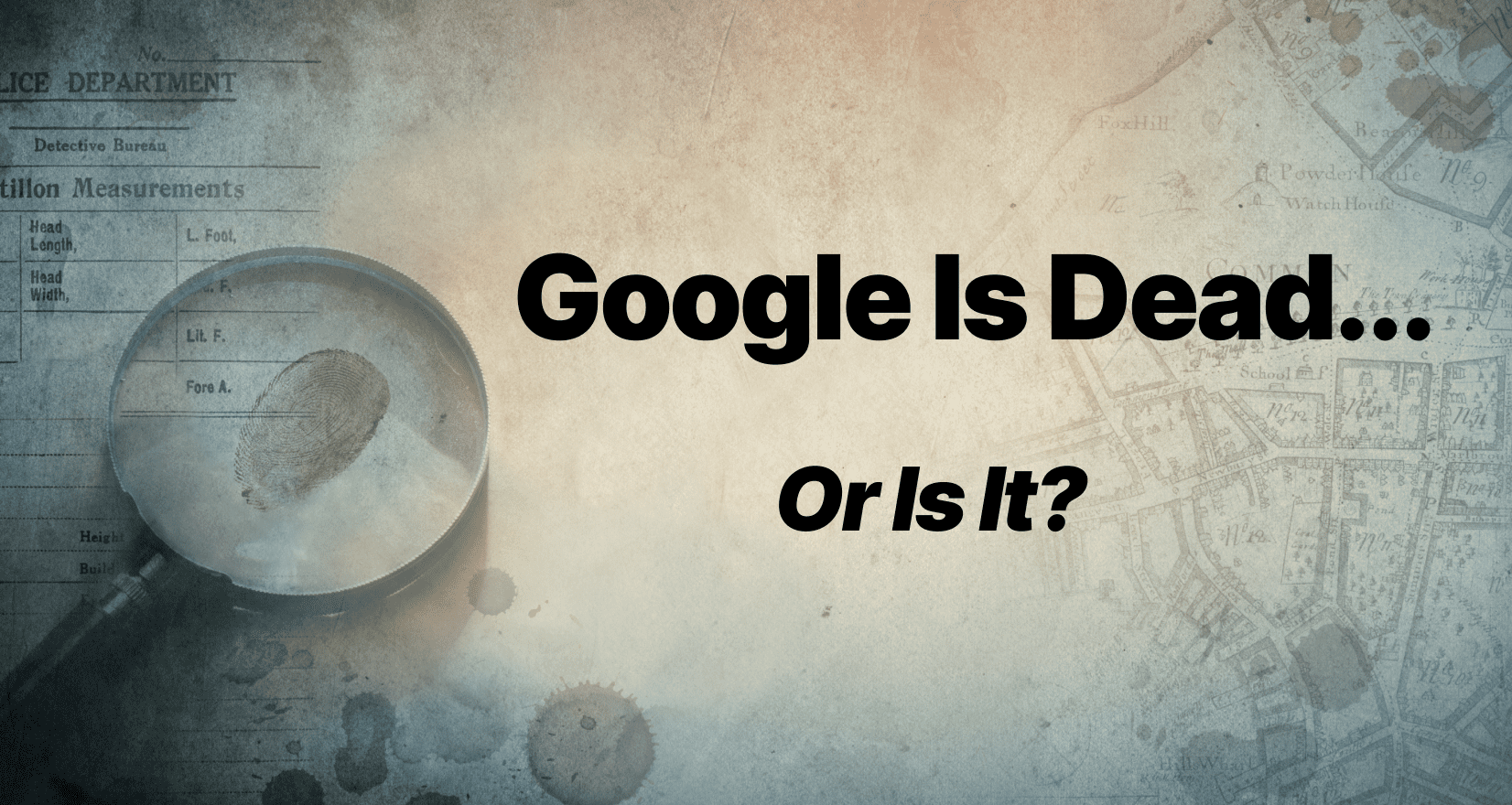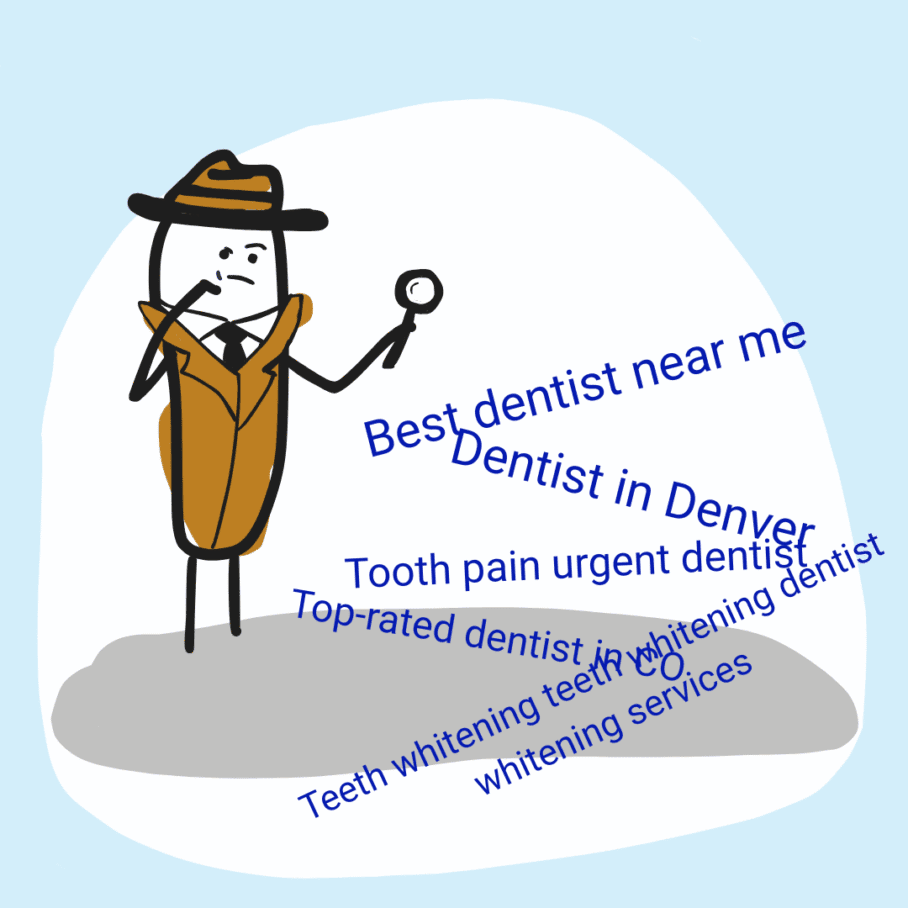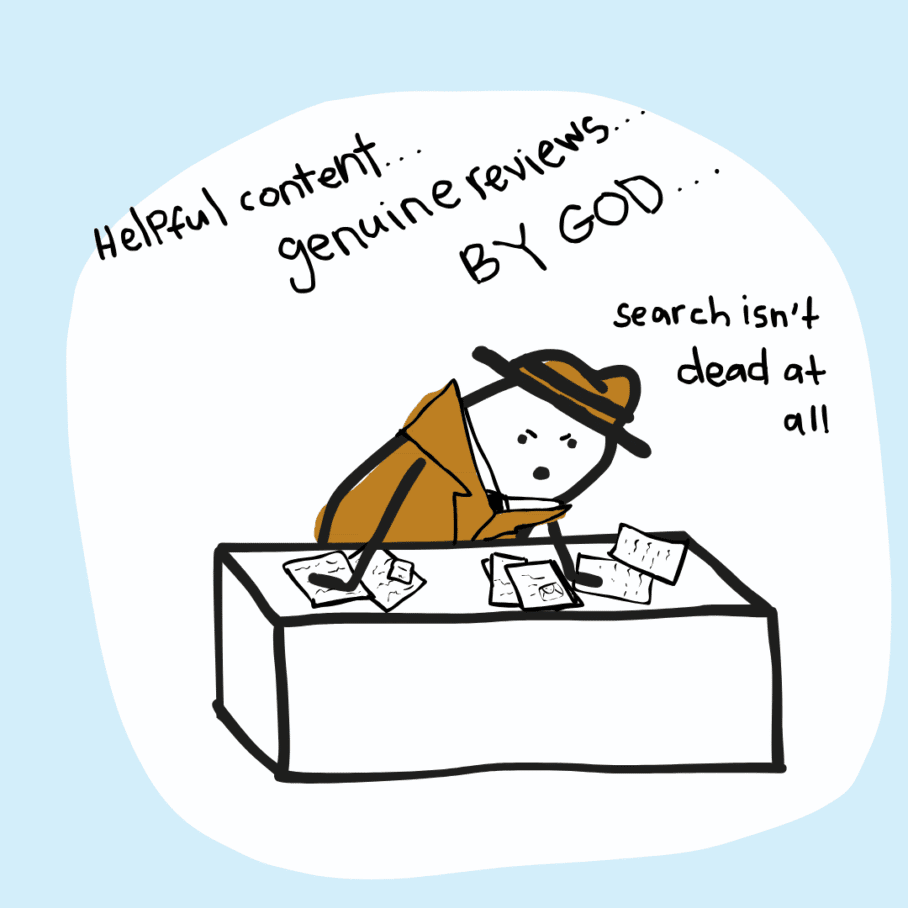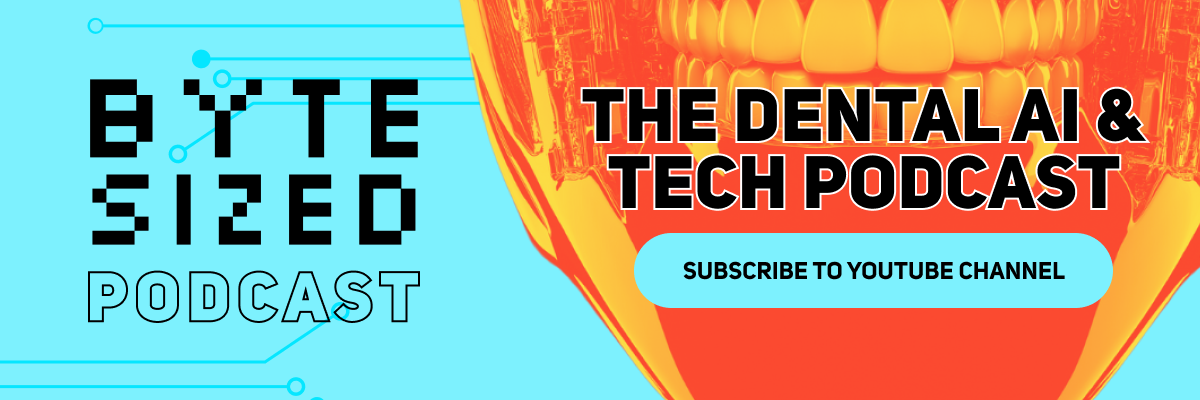
The Case of the Dead Google Search
It was a dark and stormy midnight scroll.
For years, Google Search had ruled the digital streets, helping people find everything from the best late-night taco joint to the most trustworthy family dentist in town. But lately, rumors were swirling. Whispers in the algorithmic alleys. “Search is dead,” they said. “AI killed it.”
The headlines were dramatic. The suspects? Generative answers. Chatbots. Machine learning. A whole cast of artificial characters with names like Gemini, ChatGPT, and that weird Bing thing that we’re pretty sure no one knows about.
But when the dust settled, one truth stood out: search wasn’t murdered—it was reborn.
In fact, what’s happening right now is less of a whodunit and more of a whydunit. Google Search is evolving, shedding its pay-to-play persona and making room for something better: genuine, local, trustworthy content. That’s great news for dentists like you, because in this next chapter, you don’t need the biggest ad budget to show up.
You just need to be real.
And in this mystery, that makes you the hard-boiled hero, a detective with a heart of gold hell-bent on discovering the truth in this crazy, upside-down internet world.
A New Suspect Enters the Scene: AI Search for Dentists
The crime scene wasn’t what you’d expect.
No yellow tape. No chalk outlines. Just a cluttered browser history and a growing sense of digital déjà vu. Search results that all looked the same. Ads wearing the masks of organic answers. Keyword-stuffed blogs promising “Top 5 Toothbrushes” but never quite brushing the surface.
And then AI walked in.
Slick. Confident. Smarter than it had any right to be. It didn’t knock. It just showed up—generating answers in full sentences, summarizing web pages before you could blink, and pulling facts from every corner of the internet like it had wiretaps in every server. People panicked. Marketers scrambled. And somewhere, an SEO consultant dropped their chai latte in slow motion.
But while some were quick to blame AI for the “death” of search, detectives with sharper eyes saw something else: AI wasn’t the killer. It was the catalyst. The plot twist.
Search, it turned out, had faked its own death. It was tired of being pushed around by spammy blogs, clickbait clinics, and misinformation peddlers. And AI? It was here to help restore order.

The Search Gets Smarter
Google wasn’t handing out blue links like cigars at a poker table anymore. No, it was smarter now. Slicker. Wired up with artificial intelligence that could slice through nonsense like a fresh scaler on tartar.
They called it the “Search Generative Experience”—a fancy name for a system that reads between the lines, cross-references a dozen sources, and spits out a polished, conversational answer faster than patient with dental anxiety running for the door.
So, what’s the new search situation? Let’s examine the evidence.
Clue #1: Answers Are Smarter Than Ever
Forget ten blue links and a prayer. These AI-powered summaries don’t just find the answer, they become the answer.
You’ve got to hit the target quick. Be clear. Be human. If your dental blog lays out how to handle a chipped tooth like you’re talking to a nervous patient at the front desk? You might just land a starring role in Google’s AI summary—top billing, above the fold.
Clue #2: Relevance Is the New Kingpin
Old SEO tactics are the first to get cuffed. Stuffed meta tags, keyword cramming, and clickbait titles pretending to be helpful—each one has floundered under the harsh light of AI’s new spotlight. They used to run the block, sure. But now? They’re looking outdated. Sweaty. Guilty.
“You there,” the detective barked. “Keyword-Kevin. Remember that blog post: ‘Best Dental Implants in [Your City]’ written 300 times with the same copy-and-paste paragraph?”
Kevin gulped. “It worked in 2016…”
“Yeah, well,” the detective said, flipping the notepad closed and lighting a comically large cigar. “It’s 2025. And the algorithm’s smarter now.”
Clue #3: The Little Guys Are Taking the Lead
Here’s the real twist: the loudest voice doesn’t always win anymore. Increasingly, it’s the helpful one. The genuine one. The dentist who posts a simple short-form dental video answering a common question, without a six-figure ad budget or a team of consultants.
AI sees through the fluff now, see? It lifts up content that actually helps people, and that means local dental practices have a serious edge.
Because you’re not just another website with stock photos and recycled copy. You’re the expert. The one with real answers. Real value. The one Google’s new search model is quietly rooting for.
So light up a desk lamp, dust off your content calendar, and start writing like a patient’s got a question and you’re the only one who knows the truth.
Because in this town? The smart, honest voice finally gets the mic.

The End of Pay-to-Play? Not Quite, But Close
It used to be that if you had deep pockets and a catchy tagline, you could buy your way to the top every time. No questions asked. You tossed your money on the table, and bam, your dental ad showed up faster than a molar in a meat grinder. (Don’t ask us what that means, but it sounds very moody and dramatic.)
These days? An investment ain’t a bad thing, but you have to have the chops to back up your claims. When approaching dental PPC, remember these case notes:
Flashy Ads Don’t Fool the Algorithm Anymore
Sure, paid dental ads still have their place, like when someone chips a tooth during midnight meeting with a mysterious dame and needs help now. But AI? It’s not dazzled by glitter and flash. It wants substance. Truth. A landing page dripping with keywords but empty on answers? That’s the digital equivalent of a crooked smile.
AI reads it. Sniffs it. Licks it. And tosses it in the discard pile like last week’s appointment postcards.
But that blog post your hygienist wrote about calming dental anxiety? That hits. That helps. That climbs.
What we’re saying is you should create real, helpful content to support your paid dental marketing campaigns.
Patients Are Getting Wise
They’ve seen the tricks. They know when they’re being sold to. Today’s patient doesn’t want a pitch, they want hard evidence.
A heartfelt five-star review. A straight-talking article. A short dental video where the doc explains what to expect during a root canal without the surgical mask of marketing lingo. That’s what people trust.
Even in paid content, prioritize helpfulness over hype.
Organic Content Is Where the Real Money Is
You’ve been planting seeds for months—maybe years. A dental blog here. A patient testimonial video there. That five-star Google review from someone who finally smiled in family photos again.
Well, friend, it’s harvest season.
AI is pulling that content to the top, not because it’s shiny, but because it’s real. If you’ve been investing in dental SEO, patient education, and community-focused content, now is your moment. Blogs, videos, FAQs, and Google reviews are more valuable than ever. These aren’t just marketing fluff for chumps and patsies. They’re signals to Google’s AI that your practice is genuinely worth recommending.
Where Paid Ads Still Work
Don’t get us wrong, in the landscape of AI search for dentists and consumers alike, paid search still has muscle. In particular, you’ll get the best results for your dough when you focus on:
- Emergencies that need fast action
- New patient promos
- Filling the cracks while your organic engine warms up
But for long-term success, the real currency is trust.
Five Moves to Own the Digital Streets
By now, the picture’s clear and the evidence is all coming together: AI is running the show in Search City, and it’s not taking bribes. It wants real voices, real answers, and local pros who show up when the heat’s on.
Dentists like you? You’re sitting on a gold mine.
But if you want to rise above the noise and shine in the spotlight, you’ll need a plan.
Here’s your dossier.
1. Answer the Questions People Are Too Nervous to Ask
Every day, they come in with their fears tucked behind their smiles.
“Does whitening toothpaste even work?”
“What do I do if this crown falls out while I’m eating a hearty steak with my whiskey?”
“Is it bad if my gums bleed like a crime scene every time I floss?”
You’ve got the answers. Don’t keep ’em locked in your operatory. Turn those questions into blog posts. Drop a few truth bombs on social media. Keep it clear, keep it real, and for the love of enamel, keep it human.
AI’s out there, scraping every corner of the web looking for helpful content. Give it something worth finding.
2. Own Your Google Business Profile Like a Crime Boss Owns His Turf
This ain’t optional. Your Google Business Profile is your digital dental reception, and AI checks it first.
So make it brighter than a penny with a spit-shine:
- Correct contact info
- Up-to-date hours
- Photos that actually look like your office
- Real replies to reviews, even the dicey ones
If your profile’s a ghost town, don’t expect AI—or patients—to come knocking.
3. Collect Reviews Like Evidence
No fluff. No fakes. Just straight-up, honest words from real patients. AI’s got a nose for authenticity now. It can sniff out a staged testimonial like a gumshoe smells bad bourbon.
Ask your patients to speak from the heart. Bonus points if they mention your name, the procedure, or how your assistant made them laugh while they waited.
Need help learning how to ask patients for Google reviews? Our blog is full of strategies that lead to successful, closed cases.
4. Shoot Straight…On Video
You don’t need moody, dim lighting or a boom mic. Just you, your phone, and a little know-how.
Examples?
- “How to calm dental anxiety before your visit”
- “What to expect during a first orthodontic consultation”
- “Flossing tip: Try this if your gums bleed”
Post it to your site, YouTube, your dental social media accounts, and everything in between. The point is, AI sees video, and it likes what it sees.
5. Forget the Tricks. Be the Truth-Teller This City Needs
Chasing the algorithm’s like tailing a ghost; you’ll end up jaded, tired, and crushed under the weight of a mysterious past.
Instead, ask yourself this before you post:
“Would this help someone make a better decision about their dental health?”
If the answer’s yes, you’re making a real difference on these streets. AI search for dentists and users alike? It knows the real thing when it sees it.

Case Closed—Why the Future of Search Belongs to Real Dentists
The mystery is solved. AI didn’t kill search. No, it exposed the con artists, cleared out the noise, and handed the mic to someone who deserves it.
You.
You, the dentist who actually explains things. You, the hygienist who answers real questions on social. You, the team that shows up in your community, not just your Google Ads account.
In this brave new world of AI-powered search, flashy doesn’t win. Helpful does. And when patients ask questions—about whitening, braces, gum pain, or “Why does my kid’s breath smell like an old boot?”—search isn’t just crawling keywords anymore. It’s looking for honest, human, helpful answers.
And guess what? Those answers don’t have to come from billion-dollar brands or glossy influencers. They can and should come from local dental practices that care.
Case closed.
Frequently Asked Questions
How can I get my dental blog content featured in AI-powered Google search results?
To get your blog content featured in AI summaries or high-ranking positions, focus on answering specific patient questions in a clear, conversational tone. Use headings that match real search queries (e.g., “What should I do if my filling falls out?”), write in short, digestible paragraphs, and avoid jargon.
Google’s AI values authenticity and usefulness over keyword stuffing, so prioritize content that genuinely educates and reflects your in-practice expertise. Bonus tip: Embed a short video or infographic for added visibility. AI loves multimedia.
Are Google reviews still important now that AI is changing how patients find dentists?
Yes, more than ever. AI search for dentists doesn’t just count how many reviews you have; it evaluates their content and tone. Dental reviews that are specific, emotional, and detailed are powerful signals.
Encourage your patients to describe their experience in their own words and mention treatments when possible. These reviews help AI understand what makes your practice trustworthy and relevant.
Is it still worth running Google Ads if AI is prioritizing organic content?
Yes, but the strategy is shifting. Paid dental ads still play a valuable role, especially for high-intent searches like “emergency dentist near me” or “same-day crown.” However, for long-term visibility and patient trust, organic content is where AI places more weight.
Think of paid ads as your fast lane, and your organic content as the highway you build brick by brick. The best strategy now is a hybrid: use dental ads to drive urgent traffic, while investing in authentic blogs, FAQs, videos, and reviews that keep you relevant in AI-driven search results.
About the Author: Megan Nielsen is an SEO strategist and the Grand Overlord of copywriting at My Social Practice. My Social Practice is a dental marketing company that offers a full suite of dental marketing services to thousands of dental practices throughout the United States and Canada.


![[Byte Sized Podcast Ep. 29] Building the Infrastructure for AI in Dentistry Feat. Dr. Kianor Shah - AI search for dentists - My Social Practice - A dental marketing company helping practices find new patients My Social Practice - A dental marketing company helping practices find new patients - AI search for dentists](https://mysocialpractice.com/wp-content/uploads/2026/02/byte-sized_ep29.png)




![[Byte Sized Podcast Ep. 29] Building the Infrastructure for AI in Dentistry Feat. Dr. Kianor Shah - AI search for dentists - My Social Practice - A dental marketing company helping practices find new patients My Social Practice - A dental marketing company helping practices find new patients - AI search for dentists](https://mysocialpractice.com/wp-content/uploads/2026/02/byte-sized_ep29-100x100.png)

